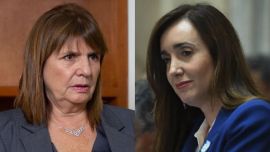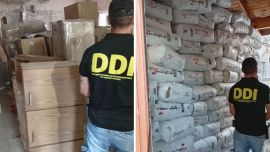Way ahead of the times, Argentine politicians have always put an incredible amount of importance on carefully staged photos that must appear spontaneous. Ascribing to the maxim that “a picture is worth a thousand words” – and decades before the existence of Facebook and Instagram – Peronists have made an art of posing at asados, sipping on some mate, and generally looking merry with each other, in order to indicate to their networks of followers and influencers that they are getting things done. Before the digital age, these black-and-white pictures were printed on newspapers and distributed widely, allowing a fairly welleducated population to understand who had who’s political support, without having to rely on critical analysis and in-depth reading. Pictures created a direct form of communication that was immediately more efficient than text, in the same way that video — first on TV and later through smartphones — is today’s preferred medium.
Just like Mauricio Macri before him, President Alberto Fernández took to the international front to garner support for his administration and its public policies, looking for pictures. Fernández first flew to Israel in the context of the 75th anniversary of the liberation of Auschwitz, held a tête-à-tête with Premier Benjamin “Bibi” Netanyahu, and had quick one-twos with France’s Emmanuel Macron and US VicePresident Mike Pence. While he was snubbed at the last minute by Russia’s Vladimir Putin, President Fernández had more than enough material to fill his social media accounts with photos that portrayed him as a global statesman. His intentions were clear: to demonstrate global support for Argentina’s necessary debt restructuring to come, particularly when it comes to the difficult negotiation with private creditors which include Wall Street heavyweights and hedge funds.
Left in charge, Cristina Fernández de Kirchner did all she could to hide herself from sight back in Buenos Aires, once again relying on silence to send her own message: I am not trying to rule Alberto. The president quickly flew out again, this time to meet none other than his Holiness Pope Francis. “I asked him for help with our debt,” Fernández told reporters after a meeting that lasted exactly twice as long as the Holy Father’s reunion with Macri — 44 minutes — and was reported to have been extremely candid. The group picture that came after included a slight smile, quite the opposite to what his predecessor had received from a calculating Francis. Alberto knew he got what he went for.
The pan-Peronist Frente de Todos (“Everyone’s Front”) is focused on tackling Argentina’s most immediate problems: galloping inflation and a massive debt burden. With the Social Solidarity law, they communicated their intention to pay the creditors, but crucially, only under conditions that are fair and which allow for Argentina to “get back on its feet.” By freezing public service bill hikes, imposing double severance payments, and intensifying currency controls, they are looking to “break inflationary momentum.” Ministers and union leaders continue to claim salaries will outstrip inflation. As mentioned last week in this column, the Fernández administration knows it needs to build credibility and has so far used “performative utterances” to try and force reality to resemble their expectations. It is working in this early stage – Alberto’s approval ratings have surged and the general population, along with major media outlets, are giving him a chance. But without real and sustainable economic growth, all they are doing is buying time.
EARLY FISSURES
Yet, as Economy Minister Martín Guzmán meticulously crafts his master plan for a quick and convincing restructuring, Cristina’s former economy minister is rebelling. Axel Kicillof, now in charge of Buenos Aires Province, told private creditors he has no intention of paying capital payments on US$750-million worth of provincial debt which have already expired. He opened up a “voluntary” reprofiling which so far has forced him to twice postpone the expiration of his offer, putting the province at a serious risk of default. A potential default could set a dangerous precedent for Guzmán, who is looking for a “good faith” negotiation with creditors with the support of the International Monetary Fund and major sovereigns. While Guzmán has indicated the province and the sovereign are working in synchronicity, it feels like the Frente de Todos is showing its fractured being. Will Kicillof blow it for everyone, just to avoid a US$250-million payment, even if the province is broke? Will Guzmán bail him out after saying he won’t? Actions speak louder than photographs here.
While Kicillof’s intransigence isn’t the only indication of early fissures in the governing coalition, it is nothing next to what Macri and his rebranded Juntos por el Cambio (“Together for Change”) coalition is showing in terms of cohesion. Once again relying on the maxim that videos are even more powerful than photos, a clip of a very relaxed Macri speaking to members of his coalition from a Patagoinan tourist town sparked outrage among the leaders of the opposition. Macri literally said that he warned his ministers about the reckless level of borrowing they were pursuing, as if he weren’t personally responsible for the economic disaster he led the country into. The likes of Alfredo Cornejo, chairman of the Civic Radical Union (UCR) – which is a major power player in Macri’s coalition – fumed. And it got worse.
Jaime Durán Barba, the Ecuadorean political advisor and mastermind of Macri’s surprise 2015 electoral victory, praised Mrs. Fernández de Kirchner’s political prowess in an interview with political blog LetraP. “She is the most brilliant woman in Argentina’s political history,” Durán Barba said, noting he had always considered polarisation against her a bad political strategy. While this is not the first time Durán Barba has spoken positively of CFK – while denying his role in the construction of a deeper grieta –it sparked outrage within the ranks of the opposing coalition, many of whom blame the guru and former Cabinet chief Marcos Peña for creating a deficient, and ultimately losing, electoral strategy. The internal fractures were laid bare this week in a vote on the annulment of Macri’s fiscal pact, where Macri’s PRO party — presided over by Patricia Bullrich and currently following the initiative of City Mayor Horacio Rodríguez Larreta — voted with the Peronists (a win for Chamber of Deputies Speaker Sergio Massa), while the UCR and the Civic Coalition (the other members of Juntos por el Cambio) voted against. Indications of what’s to come.
Macri’s cathartic comments, which demonstrate a total lack of comprehension of the impact of his words as a former head of state that could potentially lead the opposition, brings to the fore the internal contradictions that formed his governing coalition. And they also put into question, just as much as Durán Barba’s statements, its capacity to act as a unified opposition. The video, even if taken out of context (and it doesn’t seem like it was), sent a very negative message to his troop. Just as Axel Kicillof’s potential default could truly hamper Fernández’s capacity to successfully restructure the debt, rendering his international tour and several photographs with global leaders — the most important of which was Francis — useless.





















Comments